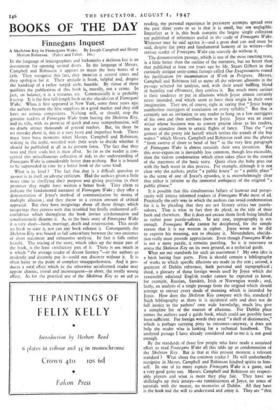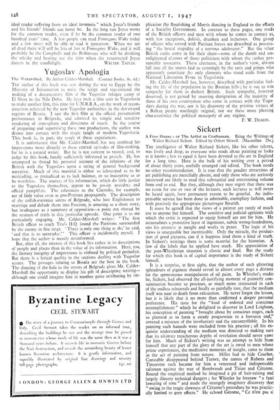BOOKS OF THE DAY
Finnegans Inquest
A Skeleton Key to Finnegans Wake. By Joseph Campbell and Henry Morton Robinson. (Faber and Faber. 16s.)
IN the language of lexicographers and locksmiths a skeleton key is an instrument for opening several doors. In the language of Messrs. Campbell and Robinson it appears to mean the bare bones of a Crib. They recognise this fact, they mention it several times and they apologise for it. Their attitude is frank, helpful and, despite the handicap of a rather turgid style, humble. By virtue of these qualities the publication of this book is, morally, not a crime. In „fact, on balance, it is a virtuous act. Commercially it is probably
scoop. It is the first full-length book on the elucidation of Finnegans Wake. When it first appeared in New York, some three years ago', the authors became the first suppliers in a good market and they still have no serious competitors. Nothing will, or should, stop the genuine readers of Finnegans Wake from buying the Skeleton Key, and its title, with its promise of quick and easy comprehension, will no doubt attract thousands of general readers. But, let there be no mistake about it, this is a very hasty and imperfect book. There must have been moments when Messrs. Campbell and Robinson, waking in the night, wrestled with their souls to decide whether it should be published at all in its present form. The fact that they won and their souls lost is their affair. So far as the reader is con- cerned this miscellaneous collection of aids to the understanding of Finnegans Wake is considerably better than nothing. But it is bound to be superseded in time by a better book of the same kind.
What is its kind ? The fact that that is a difficult question to answer is in itself an adverse criticism. Had the authors given a little more time to clarifying their purpose and giving precision to their premises they might have written a better book. They claim to indicate the fundamental narrative of Finnegans Wake ; they offer a demonstration of Joyce's method of communication by means of multiple allusion ; and they throw in a certain amount of critical appraisal. But they have misgivings about all theSe things, which misgivings they express with that troubled but finally undaunted self- confidence which throughout the book invites condemnation and simultaneously disarms it. As to the basic story of Finnegans Wake it is very short—birth, marriage, death and resurrection. This needs no bock to state it, nor can any book exhaust it. Consequently the Skeleton Key was bound to fall somewhere between the two extremes of short statement and exhaustive analysis. In fact it falls rather heavily. The tracing of the story, which takes up the major part of the book, is the least satisfactory part of it. There is not much in it which "the average reader of decent literacy "—as the authors so modestly, and decently put it—could not discover without it. It is often hasty to the point of complete misapprehension. And it pro- duces a total effect which to the otherwise uninformed reader may appear chaotic, trivial and inconsequent—in short, the totally wrong effect. As for the practical use of the Skeleton Key as an aid to reading, my personal experience in persistent attempts spread over the past three years or so is that it is small, but not negligible: Imperfect as it is, this book contains the largest single collection yet published of references useful in the study of Finnegan Wake. Whatever may be said against it—and a great deal can and must be said, despite the piety and fundamental honesty of its writers—the serious reader of Finnegans Wake can scarcely do without it.
The demonstration passage, which is one of the most exacting tests, is a little better than the outline of the narrative, but no better than that published at least ten years ago by Mr. Stuart Gilbert in thae curiously antique serio-comic farrago called Our Exagmination round. his factification for incamination of Work in Progress. Messrs„ Campbell and Robinson fail to name all the relevant allusions In the passage selected for analysis, and, with their usual baffling blend- of humility and effrontery, they confess it. But much more serious_ is their tendency to put in allusions which Joyce almost certainly never intended, and which seem to have their origin in their own imagination. They are, of course, right in saying that " Joyce hangs- numberless outriggers of association on every syllable." But that is certainly not an invitation to any reader to hang on a few outriggers of his own and then attribute them to Joyce. Joyce was an exact writer whose business was to convey precise ideas to his readers, not to stimulate them to erratic flights of fancy. Thus the "coy gesture of the pretty isle herself which invites the assault of the bay waters " which Messrs. Campbell and Robinson read into the phrase " from swerve of shore to bend of bay " in the very first paragraph. of Finnegans Wake is almost certainly their own invention. But this over-expansion is inevitably less common, though less excusable, than the violent condensation which often takes place in the course of the statement of the basic story. Quite often the baby goes out with the bath water in this process. For example, although it is not clear why the authors prefer "a public house " to " a public place as the scene of , one of Joyce's episodes, it is overwhelmingly cleat that either is inferior to the immortal ambiguity of the original "a
public plouse." . - It is possible that this simultaneous failure of humour and perspi- cacity will irritate informed readers of Finnegans Wake most of all: Practically the only way in which the authors can avoid condemnation- for it is by pleading that they are not literary critics but puzzle- solvers. That is what in fact they do plead, in the title of their book and elsewhere. But it does not excuse them froth being labelled as rather poor puzzle-solvers. In any case, cryptography is not enough. Finnegans Wake cannot be deciphered, for the simple reason that it is not written in cipher. Joyce wrote as he did to express his meaning, not to obscure it. Nevertheless, elucida- tion really must precede appreciation. Even though Finnegans Wake is not a mere puzzle, it remains puzzling. So it is necessary to assess the Skeleton Key on its own ground, as a technical guide.
What are our standards for such an assessment ? My own idea is a bOok having four parts. First it should contain 'a bibliography of works to which specific allusions are made in the text ; second, a gazetteer of Dublin reference, both personal and topographical ; third, a glossary of those foreign words used by Joyce which the reasonably educated English reader cannot be expected to knoW, for 'example, Russian, Sanskrit, Irish or Norwegian words ; and, lastly, an analysis of a single passage from the original which should attempt to extract every shade of meaning which is intended by Joyce. How does the Skeleton Key compare with this standard ? Such bibliography as there is is incidental only and does not do full justice to the authors' own wide knowledge, much less give a complete list of the sources of allusions. For Dublin place names the authors used a guide book, which could not possibly have been sufficient. For foreign words they used " a shelf of dictionaries," which is perhaps carrying piety to extremes—anyway, it does not help the reader who is looking for a technical handbook. The analysed passage I have already considered and to me it is not good enough.
By the standards of those few people who have made a sustained effort to read Finnegans Wake all this adds up to condemnation of the Skeleton Key. But is that at this present moment a relevant standard ? What about the common reader ? He will undoubtedly recognise in Messrs., Campbell and Robinson kindred spiriti to him- self.. In one of its many aspects Finnegans Wake is a game, and a very good game too. Messrs. Campbell and Robinson are respect- able players and what is more they play fair. They have no shillelaghs up their jerseys—no reminiscences of Joyce, no notes of tutorials with the master, no memories of Dublin. All they have is the book and the will to understand and enjoy it. They are " that,
ideal reader suffering from an ideal insomnia " which Joyce's friends and his friends' friends can never be. In the long run Joyce wrote for the common reader, even if he be the common reader of two hundred years' time. A few people can read Finnegans Wake today and a few more will be able to read it tomorrow. When we are all dead there w:11 still be lots of fun at Finnegans Wake, and it will probably be the Campbells and the Robinsons who will be drinking the whisky and beating out the time when the resurrected Joyce



































 Previous page
Previous page